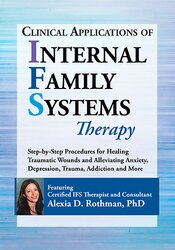

After decades of clinical innovation and recent scientific research, the empirically validated Internal Family Systems (IFS) model has been shown to be effective at improving clients’ general functioning and well-being. This effective model provides clinicians with procedures for helping clients with the most challenging mental health profiles to heal the wounded, burdened, and traumatized parts of their systems.
The IFS model provides a compassionate, respectful, non-pathologizing approach to understanding the organization and functioning of the human psyche.
The transformative IFS approach embraces and celebrates the natural multiplicity of the mind. Its assumption that every part of the system has good intention and valuable resources allows clinicians to approach even the most troubling of “symptoms” with compassion and respect. IFS offers therapists a powerful and effective set of tools for empowering clients with a wide range of clinical profiles to heal the wounded and burdened parts of their internal systems, resulting in:
IFS is a powerful treatment modality. Once you experience it, you will want to incorporate it into your practice.
Through instruction, video demonstration, and experiential exercises, Alexia D. Rothman, Ph.D., Certified IFS therapist and college of Dr. Richard Schwartz (founder of IFS) will show you step-by-step how to apply the most effective, empirically validated IFS interventions to help your clients connect with and understand their conflicting parts to facilitate deep, lasting healing.
This online program is worth 6 hours CPD.
| File type | File name | Number of pages | |
|---|---|---|---|
| Manual - Internal Family Systems Therapy (1.8 MB) | 39 Pages | Available after Purchase |

Alexia (Lexi) D. Rothman, PhD, is a certified IFS therapist and consultant in Atlanta, GA. Dr. Rothman has been in private practice since 2004. She has received extensive training in Internal Family Systems Therapy from IFS developer Dr. Richard Schwartz and has assisted in multiple Level 1 and IFS trainings around the country, as well as serving as a professional consultant for IFS therapists.
She is a United States Presidential Scholar who graduated summa cum laude from Emory University as a Robert W. Woodruff Scholar. Dr. Rothman received her PhD in clinical psychology from UCLA, where she was an Edwin W. Pauley Fellow and a National Science Foundation Graduate Research Fellow. She has held adjunct faculty positions at Emory University and Agnes Scott College.
Speaker Disclosures:
Financial: Dr. Alexia Rothman maintains a private practice. She is co-hosts of the podcasts IFS Masters and Explorations in Psychotherapy. She is a paid trainer with the IFS Institute, and she receives a speaking honorarium and recording royalties from PESI, Inc. Dr. Rothman receives compensation as a consultant. She has no relevant financial relationships with ineligible organizations.
Non-financial: Dr. Alexia Rothman is a member of the American Psychological Association, the Georgia Psychological Association, and the National Register of Health Service Psychologists.
IFS Step-by-Step
Step 1: Using Meditative Processes to Identify and Connect with a Target Part
| 5 |
|
| 4 |
|
| 3 |
|
| 2 |
|
| 1 |
|
Satisfaction Guarantee
Your satisfaction is our goal and our guarantee. Concerns should be addressed to info@pesi.co.uk or call 01235847393.
Please wait ...